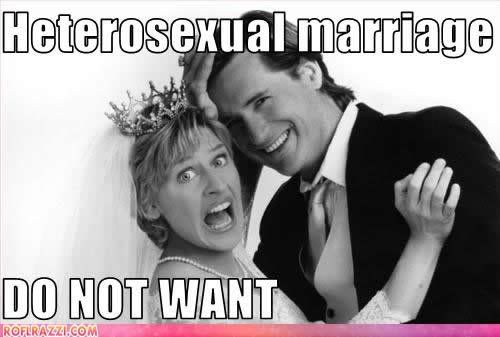
The other day I overheard some discussion by a new PhD student talking to others about how before the moment of the AIDS crisis in the '80s and '90s the gay rights/liberation movement looked exactly like it does today. I blundered into the conversation reminding him that he needed to look further back to the Gay Liberation Front in the 1960s and 70s--who were much more radical than most of the mainstream organizations right now.
He later came up to me and said I was correct that he needed to look further back and I apologized for jumping in uninvited to his conversation. Then he, I, and another graduate student turned to the topic of gay marriage (yawn). He was making this asinine argument that marriage is not an institution, that somehow 1 marriage is not related to another in any particular way. I was taken aback by this neophyte's presumption to just deny the role of marriage as a kind of institution. The non-gay graduate student suggested that to include gays in marriage suggests that heterosexual people would have to rethink the meaning of marriage in a positive way.
My vanilla-ass colleague's logic might make sense if:
1) marriage is somehow not defined by a series of laws that govern how you might enter and leave the arrangement and associated rights and privileges (e.g. citizenship and immigration).
2) somehow culture did not help perpetuate some idea of and function of marriage or any other arrangement, civil, political, etc.
3) every couple is a singular manifestation of a purely unique interaction, which if Freud teaches us anything is that certain familial dynamics perpetuate particular patterns of interaction.
But I realized this will probably this gay-establishmentarian's dissertation topic, and I also realized these are the logical absurdities to which gay marriage advocates will insist on in order to make their case.
I've concluded that actually this sort of logic is exemplary of what is going on with the gay rights establishment. It is a turn to empowerment through member presence in institutions (civil, economic, religious, political). This institutional activism is related to the contradictory importance to the practice of "coming out." Whilst this act is certainly a public acknowledgment and therefore identification with being queer, it also provided for some a sense of safety in numbers--the fact that we are everywhere means that we cannot be eliminated. This practice can be very powerful and important for gays, which depending on community of origin and religious background can be a rather lonely, tortuous, and difficult period of anyone's life.
At the same time this act, for many, functions as a political act in itself which indicates affiliation with a stigmatized group. Now that gays are attempting to enter the sacrosanct realm of marriage this is considered to be the apex of queer political acts for the gay mainstream. I, along with those from organizations like Gay Shame and sometimes even people like Judith Butler and Leo Bersani, have insisted that this cannot be the limit of queer politics, that we need to embed ourselves in the history of non-heterosexual movements to give ourselves a clearer sense of political purpose and clarify our goals.
But the difficulty is knowing or entering this history, it is much easier to "come out" without some knowledge of the struggle, which may or may not be harder to disregard in other marginalized and oppressed groups. Also, the ambivalent "internetization" of gay interaction by sites like manhunt, etc., tends to atomize the community more so than its middle-class, entrepeneurial exponents already are.
I guess I don't necessarily see much hope for a movement beyond this point, particularly if gay marriage finishes off what might have been a much more interesting political emergence, however short-lived it was.
2 comments:
If I have learned one thing about marriage from my own family and culture, it's that it sucks. Marriage in it's current definition is outdated and pervy. What thinking person would want to relate to someone in those definitions? My man of seven years will still be my "boyfriend", and I'll be his, thanks. Fuck the milk toast queers(but DON'T MARRY them).
Ha, thanks.
Post a Comment